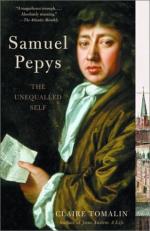and he told me that his Lordship had made a long and
a comedian-like speech, and delivered with such action
as was not becoming his Lordship. He confesses
he did tell the King such a thing of Sir Richard Temple,
but that upon his honour they were not spoke by Sir
Richard, he having taken a liberty of enlarging to
the King upon the discourse which had been between
Sir Richard and himself lately; and so took upon himself
the whole blame, and desired their pardon, it being
not to do any wrong to their fellow-member, but out
of zeal to the King. He told them, among many
other things, that as to his religion he was a Roman
Catholique, but such a one as thought no man to have
right to the Crown of England but the Prince that hath
it; and such a one as, if the King should desire his
counsel as to his own, he would not advise him to
another religion than the old true reformed religion
of this country, it being the properest of this kingdom
as it now stands; and concluded with a submission
to what the House shall do with him, saying, that
whatever they shall do, says he, “thanks be to
God, this head, this heart, and this sword (pointing
to them all), will find me a being in any place in
Europe.” The House hath hereupon voted
clearly Sir Richard Temple to be free from the imputation
of saying those words; but when Sir William Batten
came out, had not concluded what to say to my Lord,
it being argued that to own any satisfaction as to
my Lord from his speech, would be to lay some fault
upon the King for the message he should upon no better
accounts send to the impeaching of one of their members.
Walking out, I hear that the House of Lords are offended
that my Lord Digby should come to this House and make
a speech there without leave first asked of the House
of Lords. I hear also of another difficulty now
upon him; that my Lord of Sunderland (whom I do not
know) was so near to the marriage of his daughter
as that the wedding-clothes were made, and portion
and every thing agreed on and ready; and the other
day he goes away nobody yet knows whither, sending
her the next morning a release of his right or claim
to her, and advice to his friends not to enquire into
the reason of this doing, for he hath enough for it;
but that he gives them liberty to say and think what
they will of him, so they do not demand the reason
of his leaving her, being resolved never to have her,
but the reason desires and resolves not to give.
Thence by water with Sir W. Batten to Trinity House,
there to dine with him, which we did; and after dinner
we fell talking, Sir J. Minnes, Mr. Batten and I;
Mr. Batten telling us of a late triall of Sir Charles
Sydly the other day, before my Lord Chief Justice
Foster and the whole bench, for his debauchery a little
while since at Oxford Kate’s,




